A Taste of Home
Backyard gardens have gained many new devotees in recent years, however, long before it became hip to grow your own food, two South Shore families had already spent decades tending extensive gardens. They not only enjoyed the bounty of their gardens during the season, but through canning and freezing were able to eat much of their own food throughout the year. While eating healthy was important to them, these two families had other, more time-honored motivations. Pat Pregoni and Pete Rando emigrated from Italy, and the backyard gardens tended by these gentlemen and their families helped bring a bit of the old country to their new home. Like many other first generation Americans, they grew foods from their homeland; not only because it was economical and provided food that tasted far superior to store-bought counterparts, but also to stay connected to the culinary culture of their childhood.



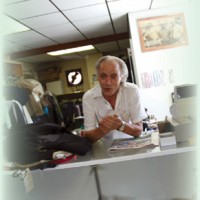


Born in Calabria, Pat spent his youth surrounded by the wonderful food of Italy. According to Pat, “ninety-nine percent of the people in my village raised their own food,” and working alongside family to grow food was just a natural part of life. By the age of three, he was already helping with the harvest; as he recalls, “you would have your own basket to pick up the olives or chestnuts that had fallen on the ground.” As was the way in his village, he began an apprenticeship when he was five years old to learn his life-long profession, tailoring. After attending school until 1:00 pm, Pat would spend his afternoons at the tailor shop, learning the trade. Despite his young age, his first job at the shop was to press the clothes with an iron heated by hot coals. Pat was a teen when his family immigrated to America and, after graduating high school, he began working at the Hingham tailor shop which he ultimately purchased in 1986. Pat and his wife have been avid backyard gardeners since they married 43 years ago.
Pete Rando, on the other hand, was born in this country in 1918 but moved back to Messina when he was three years old; his father, who suffered from asthma, thought a warmer climate would ease his symptoms. So, Pete spent his childhood immersed in the culinary culture of Italy. They had a family garden, and Pete raised rabbits that would ultimately end up on the family’s dinner table. He also trained as a barber, which was his father’s profession. In 1935, at the age of 17, Pete decided to return to the States, he arrived speaking no English with only $8 in his pocket. Because he had relatives in Hingham, he settled there, eventually opening his own barbershop which has been patronized by generations of Hingham families. He sold the shop in 1982, but even now, at age 96, returns each morning for a few hours to cut hair. Pete jokes about his work ethic, “I used to work half a day, from 6:00 am to 6:00 pm. That is half a day.”
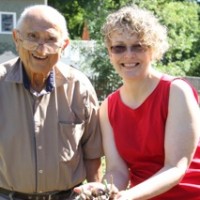
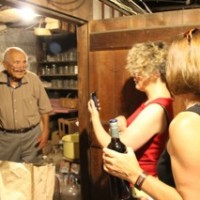
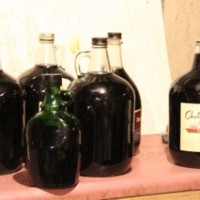
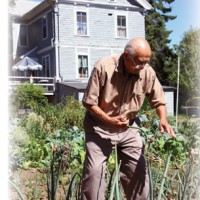


To the ordinary backyard gardener, the size of Pat Pregoni’s family garden, and the number of plants they grow in it, is staggering. In the 24 by 48 foot garden of their Scituate home, Pat and his wife Marisa, grow between 75-125 tomato plants, as well as peppers, eggplant, cucumbers, and zucchini. According to Pat, “the main thing we plant is tomatoes because we use them a lot—we have tomato salad most of the summer and then my wife boils some, freezes some, and makes her own sauce.” The Pregoni’s yard is also home to 30-35 fruit trees, including apples, pears, peaches, figs, quinces, cherries, and persimmons, as well as two chestnut and four hazelnut trees. Any bounty from the vegetable garden, and any fruit that is not eaten fresh, is preserved, marinated, canned, or frozen.
Each year, between mid-August and mid-October, Pat also forages for wild mushrooms. He collects between 500-600 pounds, which will also be preserved or frozen. Foraging wild mushrooms can be a tricky business and knowledge of the different varieties is crucial. But Pat also employs a test he learned from, as he puts it, “the old timers.” You boil the mushrooms with 3 or 4 cloves of garlic and a few silver coins. If the garlic turns green or the coins turn green or black, the batch of mushrooms is no good and you have to discard it. Another annual ritual occurs each spring, when the couple makes sausage and salami. Although they used to slaughter their own pigs, they now purchase pork butt to make sausage, and hams to make salami. Pat and Marisa make their artisanal meats in late February or early March, when the temperature is consistent. The sausages, which cure for 30-45 days, and salami, which cures for two months, are hung ten feet up in the garage, where Pat says “they get a lot of breeze and dry out.”
Pete’s garden is also a diverse and productive one. When asked what he grows, Pete responds with a grin, “Everything you can mention.” This includes: beans, broccoli, Swiss chard, radishes, lettuce, peppers, eggplants, and of course, tomatoes. As one of his few concessions to aging, Pete has cut back to ten tomato plants from his peak of twenty-four. When it comes to the garden, Pete and his wife, Nellie, have an agreement: Pete does the outside work, and Nellie does the inside work. So for decades, while he tended the garden, she canned and preserved much of its bounty. In the last twenty or so years, as age has slowed Pete down a bit, two neighbors have joined him in the garden, helping with the physical tasks that are an inevitable part of keeping a garden. They also join Pete in another tradition from his homeland—winemaking. Using a 100-year old wine press he inherited from his uncle, Pete and his friends make both Merlot and Cabernet Sauvignon in his basement. And they do what good friends have done for centuries, share the wine among friends.
Pat and Pete are equally proud of their Italian heritage, and of the country that is now their home. Their gardens have provided many rewards, but perhaps the most important is a taste of home.







